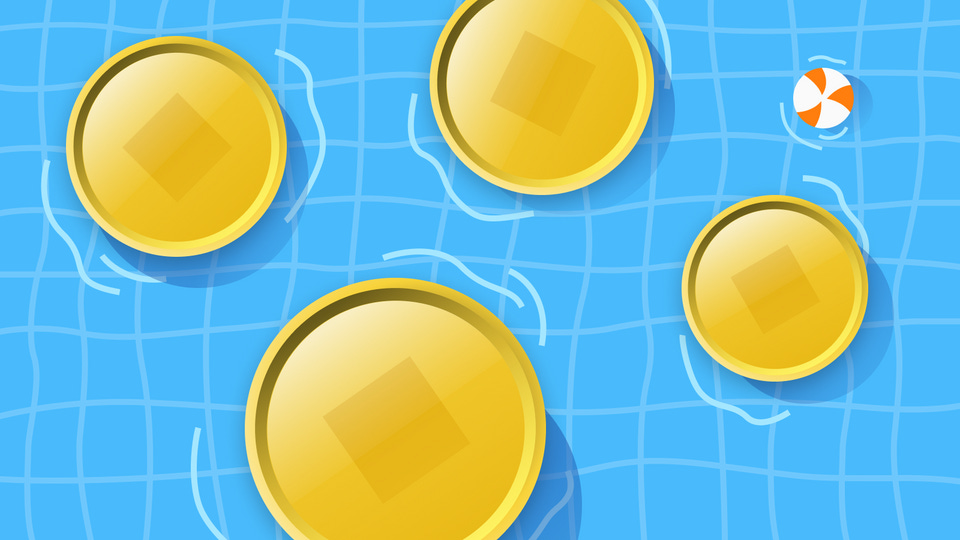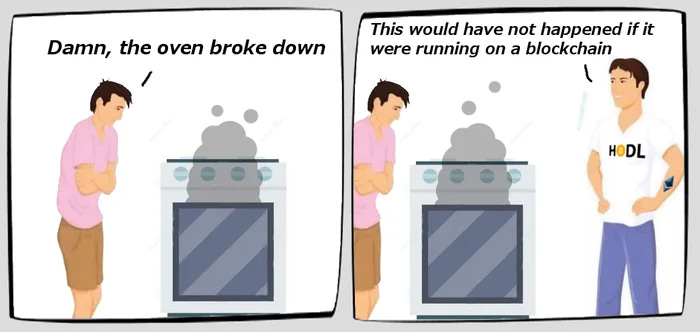Web3 And The Creator Economy: What Is It All About? | Bankless Africa Newsletter
Stay up to date with Web3 alpha, insights, news and opinion in and around Africa and the Diaspora. Subscribe Now
Hello, Bankless fam!
There’s no better time to roll up your sleeves and get relentless than in the toughest of moments. It is an honour to be able to continue bringing you information and content about Africa and it’s journey in the frontier. This week we bring you more crypto funding and partnership news across the continent, from Pillow finance’s fund raise of $18 million to Data Mynt & Yellow Cards partnership to enable businesses and merchants to transact safely, and of course, Binance’s newest campaign.
In this week's editorial, Aishat takes us on a deep dive into what the creator economy is about, how it has evolved, the challenges it's facing, and how web3 is transforming it in terms of ownership and easy access to monetization options.
On the Podcast front, Miss Purple discusses the possibilities of a more inclusive financial world with Zach, the co-founder of Jia, a DeFi platform and the news analysis in Sats & Gwei bring us more news in the crypto space
We close with an informative section on what liquidity pool tokens are and the different ways you can put them to get use.
Siyakwamukela, enjoy!
Contributors: Aishat, Abidemi, Cisco, Oge, Starfly, Angel Speaks, Miss Purple, Yofi
🏴 Inside Bankless Africa
Listen To The Newest Episode Of The Bankless Africa Podcast
Like, Share, Retweet, and Subscribe to our podcast.






📰 News & Opinion In and Around Africa
Pillow attracts $18M funding to Accelerate Adoption in Nigeria
Author: Solomon Ekanem
Pillow, a cryptocurrency platform, managed to attract $18 million in investment to speed its adoption in Nigeria and other markets. Pillow’s process involves giving prospective traders and investors a chance to manage their funds and fend off inflation & ever increasing living expenses. Pillow is developing an easy-to-use solution that encourages everyone who is interested in crypto to save, invest, and make payments in cryptocurrency.
There are over 75,000 active users of the Pillow platform, and they come from more than 60 different nations. Most of them invest and participate in saving activities using stablecoins backed by the US dollar and other popular cryptocurrencies like Ethereum and Bitcoin. It is envisaged that this investment in Pillow could help move Nigeria and other African nations up the global crypto adoption ladder in the near future. African nations are already strongly represented on the scale of crypto usage worldwide, innovations like Pillow are a welcome addition to that.
Clixpesa Is Bringing Traditional Investing Techniques to Web3
By Ryan S. Gladwin
Derrick Kachisa and Samuel Moyi are both co-founders of the Clixpesa; a payment application that looks at simplifying finances. Derrick talked about how the locally known means of savings and attempts as attaining the ability to participate in the financial landscape that most of the world is used to, were not ideal and were much further out of reach for locals in Kenya, with multiple other downsides.
The Clixpesa app which already completed its first stage of development, has much simpler tools that make saving, lending, and investing money easier and safer for users. Kachisa and Moyi also said they would be looking to, in the long run, introduce Kenyans to investing opportunities in stocks and crypto.
Mara partners World’s Biggest Afrobeats Music Festival
By Pulse Mix
PAN African digital finance ecosystem also known as MARA has offered sponsorship for the Afro Nation Ghana 2022 which is set to take place in Accra on the 29th and 30th of December 2022
Popular artists like Davido, Meek Mill, and the like would be present. This event is being projected as a platform for youths to gain digital financial literacy in conjunction with the popular culture that they are intending consume
As stated by Afro Nation, there is excitement to work with the MARA ecosystem as they both share a similar passion for establishing the youth across Africa.
Binance Launches ‘My Crypto Journey’ Campaign
Author: Apofeed
Binance, the world’s leading blockchain, has affected thousands of lives in Africa and beyond. To celebrate this transformative power, Binance launched a ‘My Crypto Journey’ series campaign for users of Binance in Africa to share how crypto has positively affected their lives.
Over 1000 African crypto users shared detailed stories of how this technology bettered their lives. Ebony, like several others, shared the story of how crypto took her from an impoverished situation in life to where she is now.
After her first encounter with crypto on Facebook, Ebony decided to learn her way out of poverty; she took to research and taught herself by watching youtube videos. Ebony noted that Binance was the focal point of her journey as it has exceptional customer service and she could trust her funds were safe. Ebony’s story showcases the true transformative power of crypto as it boosted her confidence and status.
Data Mynt Partners with Yellow Card to Enable Cash Payouts
Author: Marlene Mutimawase
The partnership between Data Mynt and Yellow Card aims to enable the following:
Africa's customers will be able to settle payments through mobile money and bank accounts, where funds will flow from a shopper's wallet to a merchant's Data Mynt wallet
Businesses across Africa will transact safely with millions of crypto owners, pay suppliers and teams from anywhere, as well as settle funds directly into their mobile money and bank accounts through the digital asset ecosystem
Shoppers will also now be able to pay using digital assets across 8 blockchains, which are automatically converted into stablecoins without extreme volatility
🥷🏾 Airdrops Hunter


Web3 And The Creator Economy: What Is It All About?
Author: Aishat
You've probably come across this term and wondered what the fuss was about right? There is a sudden rise of creators coming into the limelight, from jumping on TikTok trends, or making videos for YouTube, everyone can now become a creator.
While a few creators just put content out for the fun of it, a great majority create as a means to create a career through which they can then generate an income. Variety.com mentioned a study by Adobe that revealed that roughly half of the non-professional creatives earn money from their activities, which is not a great amount but is also worth paying attention to.
Over the years, content creation has evolved into a career path, however despite this progress, we can not help but notice that content creation continues to have its fair share of challenges.
In this piece, we will be looking at the evolution of the creator economy, the challenges it has faced and how the Blockchain will transform the creator economy.
Evolution of Economy
While it seems like everyone is now a creator, people previously made money from other jobs. Paul Saffo claimed that there were two types of economic periods before this creator economy phase:
Industrial/Producer Economy
Consumer Economy
Creator Economy (Platform-focused)
Industrial/Producer Economy
During this period, there was a need for more 'stuff', which increased the need for people to go into production. To make sure that more physical products were available, production was also streamlined with the use of machinery. In 1944, the US could produce an airplane every minute and 50 merchant ships every day. This was an incredible feat, yes, but this new abundance of products led to another kind of scarcity.
Consumer Economy
This new kind of scarcity was desirability. People now wanted products and items that were rare and innovative. Consumers were now at the forefront of consumerism, companies now had to create unique things that appealed to the customer. The government also offered significant tax returns, ensuring that consumers had enough to continuously spend. Companies hired more heads of marketing than heads of production in a bid to prove themselves to the consumer in the desirability of their product.
Creator Economy
In the consumer economy, companies shifted more towards marketing and advertising. They needed to put themselves in front of their consumers, and they utilized mass media like television, newspapers, radio, etc. While this proved effective to a point, it brought about another scarcity, 'engagement'.
The media in the consumer economy was one-sided, with a company telling you what they had on offer, so media innovations like YouTube, Facebook, Instagram, Google, etc., came about.

With the abundance of products, they were now inevitably much cheaper. Now, people wanted engagement, the level of engagement had now become tantamount to the perceived value of the product and/or service.
While this may look like the dream that many had been hoping for, it had its own challenges. Paul Saffo mentioned that the technologies that were meant to cater to freedom now became technologies of control.
Challenges Facing The Creator Economy
At the start of this article, we referenced a report by Adobe on how roughly half of the non-professional creators make money through their creations. However, making money does not imply longevity.
Most creators depend on specific platforms in order to make this money, this dependency tends to deny the creator autonomy over their content. The platform to some level determines the level of engagement you get and controls the type of content you put out, to top it off, their rules keep changing.
Recently, creators on Instagram have been complaining about how the algorithm is forcing them to create more reels. For instance, photographers would be forced to publish their pictures as videos. To publish your content on Google, you have to do certain things too, like Search Engine Optimization, to ensure that your content ranks higher on the platform.
There are a lot of challenges, but let's segment it in two:
Ownership
Truly speaking, creators create content for the various platforms. Their relevance in the space is often tied to the platform they are putting that content out on. Creators often have very few rights over their data once it has been published. At a surface level, many creators may not feel like this is a problem, but when one takes a deeper look, you find that data control has become a thorn in all economies.
Aside from that, creators don't have autonomy, they are often not able to just decide to leave a specific platform; their data, their content, their sweat, and their hard work are tied to that platform. For instance, a Youtuber may find it hard to leave YouTube because that is where they have spent their time to build their brand.
As if that wasn’t enough, the platform may decide to suspend your account, delete your content, or ban you temporarily. Why? It’s simple, you are on their platform.
So, why create content you don't own?
Monetization
We know creators make money from platforms, but do they make the best?
Many a time, creators have to build a large following before they can start monetizing their content. There are hardly any direct means for creators to make money from these platforms without first attaining that following. They must command a large audience and attract sponsors or brands who are willing to pay them for advertising. Other times, they can become affiliate marketers or receive money from their fans.
This does not mean that some platforms don't pay creators, but it is worth mentioning that it is miniscule when compared to the value creators bring.
It will therefore be safe to compare creators and these companies to the pidgin adage, "bamboo dae work, monkey dae chop" which roughly translates into, the bamboo does the work of growing and producing the fruit, the monkeys eat this fruit that they did not create.
Is there any hope for the creator then?
How the Web3 Transformation Fits the Creator Economy
What is Web3?
In two words, Web3 is a decentralized web.
McKinsey described Web3 as "the blockchain technology that stores all data on asset ownership and the history of conducted transactions; they are “smart” contracts that represent application logic and can execute specific tasks independently; and digital assets that can represent anything of value and engage with these smart contracts to become 'programmable.' "
Three crucial terms that creators should take seriously from this definition are ownership, independence, and digital assets.
On Ownership
With the aid of smart contracts, creators have a claim over their ' identities, content, interactions, and engagements'. Smart contracts record every transaction and therefore allow creators to transfer their content to other platforms.
Platforms like Mirror.xyz allow creators full control over their data. They can transfer their content from the typical Web2 blog sites to Mirror.xyz seamlessly. Creators can also tokenize their works as NFTs and list them on several marketplaces. It is important to note that these marketplaces do not own that NFT nor its data, the creator does, and transfers that ownership to the buyer upon purchase.
Below are some examples that show how creators are able to have more control over their works with the help of web3.
Token Economy/ Monetization
One intriguing aspect of Web3 is tokenization. In Web3, there are fungible and non-fungible tokens, and creators can maximize this utility to no end.
Web3 is enabling creators to monetize their works directly instead of waiting for platforms. For example, creators can receive tips from fans to their Web3 digital wallet. They can mint their work as NFTs and let their loyal audience collect it. Metaverse games for example also enable creators to ship their work directly into games. Some platforms like Rally also allow creators to generate unique fungible tokens.
With this new way of monetization, creators don't have to wait for platforms to pay them after ad-revenue generation; they can get paid directly.
Decentralization / Participatory Governance
Often, when Web2 platforms determine their features, the core team makes the choices and the creators simply have to comply. However, with decentralized governance, creators can also determine the type of features released by their preferred platforms. Platforms will not just create features that will drive revenue for their pockets but features that make sense for the entire community.
Smart Contracts
Smart contracts eliminate third parties, they also foster transparency in content creation. Creators can bring in collaborators and share funds seamlessly through the use of smart contracts; they can reward their fans and subscribers with social tokens or other types of tokens. Smart contracts are an essential component of blockchain technology, and their use cases are endless.
How To Get Started As a Creator
There's no one way to get started as a Web3 creator, however, the general advice would be to discover the kind of platform that suits your niche. If you are a painter, creating NFTs and listing on OpenSea or another platform could be a good starting point. If you are a writer, Mirror.xyz is a good publishing platform to explore.
Note though, that since you are not relying on centralized platforms for traffic, you have to create your own traffic. This is where community and being a brand will bring you the most success.
The Africa based creator platforms that are worth checking out include - but are not limited to - Nfty Tribe, Bloc Asset, Brunch & Loozr. Web3 is relatively new, and a chunk of work still needs to be done. So, roll your sleeves up, and get creative!
📚 Learning Centre
What are Liquidity pool tokens?
When a token is liquid, it’s considered to be an asset that can be easily traded without causing a change in the token's price. While a liquidity pool is the supply of tokens secured by a smart contract, liquidity pool tokens are tokens given to those who provide capital (liquidity) to liquidity pools. These Liquidity pool tokens are provided as ‘receipts’, they represent a share of the pool and allow you to withdraw from the pool what you’ve deposited, they also keep your contribution to the pool safe and secure. Read more on how you can get liquidity pool tokens and their different use cases.
Ghana Crypto & DeFi Summit 2022 is a two-day DeFi conference that will take place in Accra, Ghana, from November 3-4, 2022. BanklessDAO and Bankless Africa are pleased to be media sponsors of this event.
The main goal of this initiative is to create a common platform for all stakeholders, including the government and other institutions in and around Africa, to discuss ways in which blockchain technology, cryptocurrencies, and distributed financial protocols can help in building Africa's future economy.
The summit, supported by Uniswap Grants, explores the limitless possibilities of blockchain technology and its applications in finance, government, social good, and other sectors.
Follow DeFi Africa on Twitter for more information, and join the bDAO folks in the GCD Telegram group.

😂 Meme Humour
Thank you for subscribing to the Bankless Africa Newsletter.
Follow Bankless Africa: Website, Twitter, Instagram, YouTube, Telegram, and LinkedIn.
Was this email forwarded to you? Subscribe on Substack.








